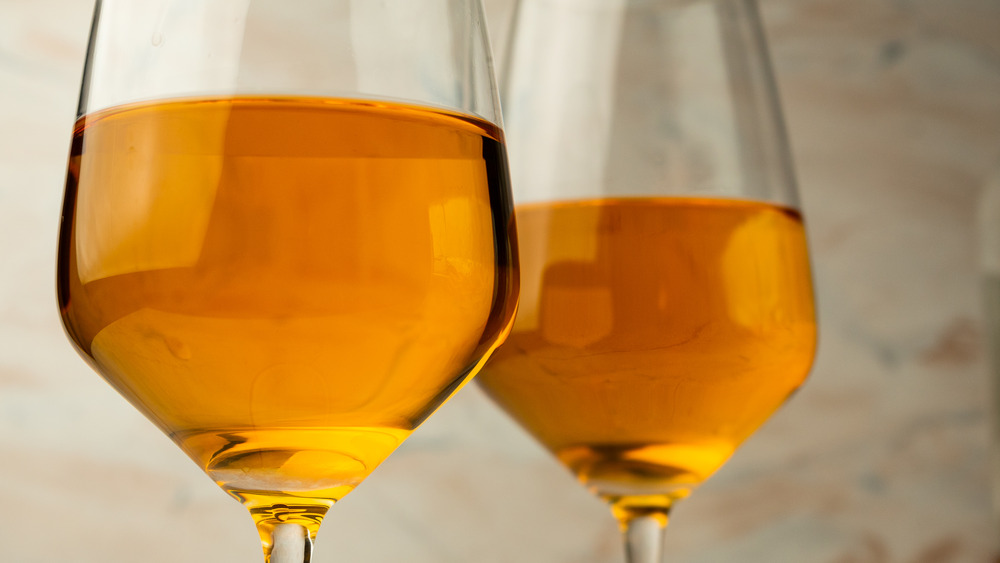You Should Be Drinking More Orange Wine. Here's Why
Unless you've ignored the past decade of wine trends, you've surely heard about orange wine. Though it has become more popular in recent years, Wine Folly notes this style of wine is actually a tradition dating back 5,000 years, most likely to the country of Georgia. The name can be misleading since some examples look like white wine while others border on amber, and zero oranges are involved. However, the distinguishing factor and more descriptive name is skin-contact wine — Wine Folly explains that orange wine is made with white grapes, but the juice remains in contact with the grape skins much like the way red wine is made, giving it a distinct hue.
In theory, any grape that can be used to make white wine can be used for skin-contact wines (via Bon Appétit). This category of wine is so variable because not only can a slew of grapes be used, but Bon Appetit notes the time the juice spends on the skins can range from a few hours to many months. The resulting effect ranges from flavors only slightly more aromatic than white wine, to something bold, herbaceous, nutty, and sometimes even smoky (via Eataly). So if you've already decided you hate orange wines, maybe try another.
It's better for your health than white wine
If for no other reason than their health, white wine drinkers should consider adding the occasional skin-contact wine to the mix. Grape skins contain polyphenols (compounds responsible for aromatic flavors), which are also linked to lower risk of heart disease, according to Healthline. Additionally, grape skins contain antioxidants known to counter cell damage and reduce the incidence of various chronic conditions, per Healthline.
All of the touted benefits of wine actually come from polyphenols and antioxidants such as resveratrol, which Healthline notes are present in the skins of grapes. Therefore, white wine, which is made without skin contact, generally has almost none of the benefits of red wine. A study in the Journal of Agriculture and Food Chemistry further demonstrated that skin-contact wines contained far more antioxidants than their white counterparts. Of course, these studies look at moderate drinking, and the potential benefits of wine should not be a free pass to drink in excess.
Orange wine makes for versatile pairings
Another vote in favor of orange wine is its excellent ability to pair with so many different types of food. Besides being in the middle on the color spectrum, orange wine also shares an overlap of qualities between red and white wine. Eataly points out that it generally has the higher acidity common in white wines, as well as some of the tannins found in red wines, which makes it capable of standing up to intensely flavored dishes. This also makes it a great option to serve at a dinner with people with different tastes, or to bring along if you don't know what's being served.
Wine Folly recommends pairing this bolder wine with exotic flavors such as curries, Ethiopian, Moroccan, Korean, and Japanese cuisine, as well as meat, fish, and bitter vegetables. Even Jancis Robinson, voted the world's most influential wine critic in 2018, tested an extensive list of notoriously hard to pair foods (think pickled vegetables and raw garlic) with a skin-contact Muscat and was incredibly pleased. We'll pass on the raw garlic and raise a glass of orange wine to our health!


